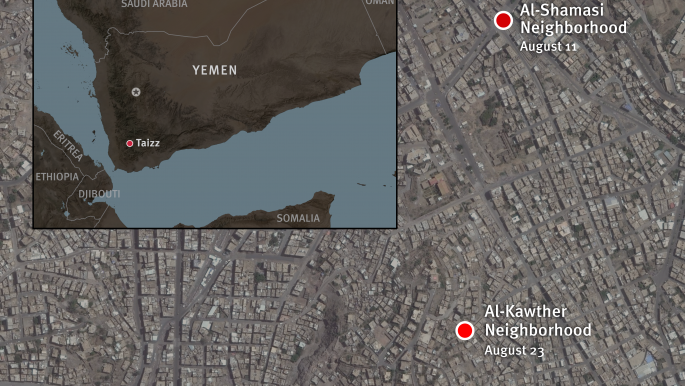Yemen's Houthi rebels 'violating laws of war'
Houthi forces and allied forces loyal to the country’s former president have repeatedly fired mortar shells and artillery rockets indiscriminately into populated neighbourhoods in the southern Yemeni city of Taiz, violating the laws of war, a leading human rights group has said.
The Arab world's poorest country has been embroiled in a conflict since March, where a Saudi-led coalition has been waging an air campaign against the Houthis.
|
|
|
|
|
Around 4,500 civilians have been killed in the conflict so far.
“Pro-Houthi forces have been shelling Taiz without regard for the safety of its residents,” said Joe Stork, deputy Middle East director at Human Rights Watch [HRW].
“The Houthis should stop firing heavy explosive weapons into populated areas of the city,” Stork added.
Human Rights Watch documented three attacks on Taiz in August 2015 by Houthi forces supported by military forces loyal to former President Ali Abdullah Saleh that killed at least 14 civilians, including five women and five children.
In the second half of August, Houthi shelling and sniper attacks on civilian neighbourhoods in Taiz killed at least 42 civilians, the United Nations Office of the High Commissioner for Human Rights reported. Residents say the attacks have continued.
Since October 2015, the Houthis have unlawfully confiscated food and medical supplies from civilians in the city, HRW said, adding that indiscriminate attacks violate the laws of war and amount to war crimes when carried out deliberately or recklessly.
Indiscriminate attacks
Human Rights Watch investigations of impact sites and weapons remnants found that artillery rockets had been used, including one apparent Grad rocket, and mortar rounds with blast and fragmentation effects that can cause injuries and damage over a wide area.
These weapons, in particular unguided rockets, are difficult to target with accuracy, and when directed toward populated areas are indiscriminate.
During its visit, Human Rights Watch saw no evidence of military installations or other military objectives that would constitute legitimate targets.
For example, one attack on August 23 hit near a group of boys playing football, killing three of them and one boy’s father, who was watching them, but witnesses said there were no military installations or forces in the area.
'Ask the Resistance to feed you'
Since early October, pro-Houthi forces at checkpoints have confiscated water, food, and cooking gas that civilians try to bring into non-Houthi controlled neighbourhoods.
Sadeq Shujaa, the secretary general of the Doctors and Pharmacists Syndicate branch in Taiz, told Human Rights Watch that the Houthi restrictions began in September but have become increasingly draconian.
Those who have complained directly to Houthi commanders have reportedly been told to “Ask the Resistance to feed you.”
In a recent incident, the Houthis confiscated drugs from three trucks that were sent by the World Health Organisation to Taiz.
The Houthis took the drugs that were intended for hospitals in areas not under Houthi control.
They have not given the Health Ministry offices in Sanaa and Taiz the authorisation to provide hospitals and clinics in non-Houthi-controlled areas with medical support.
International humanitarian law – the laws of war – which governs the hostilities in Yemen, prohibits indiscriminate attacks which strike military objectives and civilians or civilian objects without distinction.
The laws of war require military commanders to choose a means of attack that can be directed at military targets and will minimise incidental harm to civilians.
Weapons that are so inaccurate that they cannot be directed at military targets without imposing a substantial risk of civilian harm should not be deployed in populated areas.
Forces deployed in populated areas must avoid locating military objectives near densely populated areas and try to remove civilians from the vicinity of military activities.
The laws of war do not prohibit sieges of enemy forces.
However, starvation of civilians as a method of warfare is prohibited, as is confiscating or destroying objects that are indispensable to the survival of the population.
“Houthi leaders should realise that they could someday face war crimes trials for ordering or taking part in indiscriminate rocket and mortar attacks on civilian neighbourhoods,” Stork said.




